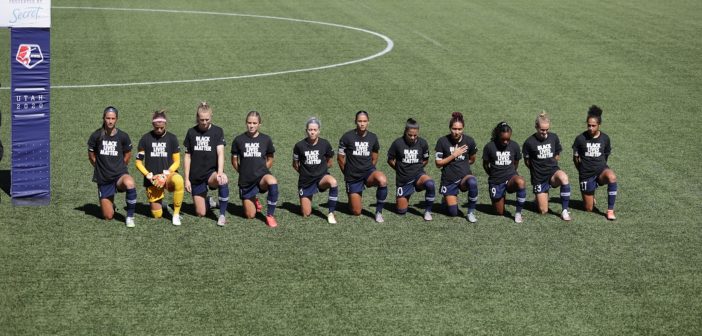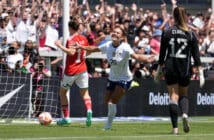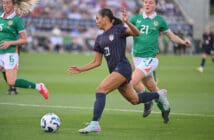Disclaimer: I’m not American, other than the year or so I spent in North America at the start of last decade, I can’t claim to have had any experience of living in the USA. I didn’t grow up reciting the Pledge of Allegiance every day nor my childhood didn’t contain that specific red, white and blue flag and rhetoric about freedom.
The opinions (and that is all they are, opinions) within this article are mine alone, and even though I don’t expect everyone to agree, I do hope you at least consider what I’m about to say.
Patriotism
For many, not all, hearing their national anthem can be a stirring thing. The song, usually sung in view of a flag, is never just a collection of words but something intended to celebrate the land it represents. Often there is, at the bare minimum, an allusion to conflict, to war and lives lost in pursuit of freedom. Whether it be the calling to arms of France’s La Marseillaise or Argentines crying, “¡Libertad! ¡Libertad! ¡Libertad!” during the Himno Nacional Argentino, a national anthem usually speaks to the collective consciousness of a nation. Anthems are something citizens can rally around, to hark in respect of their homes as they remember the fallen and strife that their forebearers toiled through.
Although patriotism exists in every country around the world, no land seems to do it quite like the United States of America. The archetypal image of an America is a loud and proud one that gets in your face, unironically hollering about freedom. No country in the awkwardly so-called Free World does patriotism quite like the US.
From the near-indoctrination of the daily pledge to the muddling and mixing of what is and isn’t American, culminating in so much symbolism in the flag. The stars and stripes coming to stand for a physical representation of what it is to be American, yet something that is perceived by so many of those who stand for it as something militaristic. For those who see themselves as the great liberators, those who closes ears and eyes to the oppression all around them as they open mouths to speak the gospel of the land of the free.
The military
Not standing for the flag; the image is one that is violently anarchistic, one that besmirches the preconceptions about the USA, one that spits on the graves of those who’ve died in the name of protecting American freedoms. Those who’ve wantonly given their lives in far flung lands, fighting political and money-grabbing wars, all whilst bearing the stars and stripes on their uniforms.
America is a young nation but one with a history plagued with conflict, both at home as well as way, it is therefore, not at all surprising that that specific American patriotism is so prevalent, or that it is indeed, so militaristic. But through it all, the flag isn’t a beacon for the military, yet that is how it is seen by many.
As Marcus Thompson explained during Meg Linehan’s Full Time podcast earlier in the month, “Sports have made the anthem and the flag synonymous, almost exclusively, to military. [] The flag is just: honour the troops.”
A reminder on today’s holiday that kneeling during the anthem as a protest has absolutely nothing to do with the military.@ThompsonScribe joined me this week on Full Time with Meg Linehan. Listen on Apple: https://t.co/NMms5DeIC9 pic.twitter.com/AMmXk6Fhi5
— Meg Linehan ? (@itsmeglinehan) July 4, 2020
For those in NWSL who’ve opted to stand for the national anthem, we’ve been quick to single out and vilify, it is the talk of the military that has repeatedly been the reason. As for those who’ve taken a knee only to stand at the start of subsequent matches? A confused message that is, at best, perceived as hypocrisy and wilful ignorance.
Origins
As you’ve likely read more than once recently, the origins of the US national anthem (before it was official the national anthem) being played at sporting events go back to a World Series game played during the First World War. During the first game of the 1918 World Series, the band at the match broke into an impromptu version of the tune that would become known as the Star Spangled Banner.
With the country at war, the song roused the crowd so much so that the band opted to play it at the remaining games in Chicago and the Red Sox owner decided to bring in a band for the remaining games in Boston.
The song would pop up at subsequent baseball games, but only for special occasions rather than every outing, with it not becoming more commonplace until the Second World War and eventually spreading to other sports.
The simple solution, and the one I would generally side with, is to stop playing the anthem before domestic sporting events as there is simply no need for it. This isn’t a position I hold exclusively with the USA either, as I pointed out after the league cup final earlier this year, God Save the Queen had no place at the match. And when juxtaposed with the four English players over the 22 starters, it only became more incongruous.
I can stand a national anthem at a game that features, you know, a national team. That’s a normal thing. Cup finals are not.
— Sophie Lawson (@lawson_sv) March 1, 2020
Vital platform
There is, however, a further nuance to the discussions surrounding taking a knee before NWSL matches and whether or not the anthem should be played. In their statement on the matter (released at the end of last month), the league lead with the line that players would be free to stay in the locker room for the anthem. A muddled message that managed to hide the intentions behind their stance and way that they had reached such an idea.
As NWSL commissioner Lisa Baird said in her statement, one of the goals of the tournament is to, “support and empower players to use their platform to make the world a better place.” And that was indeed the nuance that was so missed.
If the NWSL were to stop playing the anthem, they would be depriving players their right to take a stand – or rather, a knee – they would remove the platform from the individuals and teams.
There is no question that racism is a hugely prevalent issue in the USA – which isn’t to say that other parts of the world aren’t as bigoted, as they are – and indeed, American society has been built on keeping minority groups down. This is not a part-time fight, nor is it a fight that only black men and women should be fighting. But as one by one, NWSL players opt to stand for the anthem, the solidarity and message in taking a knee, seems to fade, looking more and more like a token gesture.
— Jessica Clarendon (@jessicadolan) September 5, 2016
It’s been three years and 10 months since Megan Rapinoe first took a knee in solidarity with Colin Kaepernick, and three years and four months since US Soccer retaliated by making it mandatory for all footballers to stand for the anthem. The policy, which has subsequently been repealed, stands as a reminder as to how tone deaf many can be.
It’s been over half a century since the accepted end of the American civil rights movement, but the systems of oppression still march on in the land of the free. As the NWSL Challenge Cup goes on, the impact of those involved taking a knee may become more abstract for some fans but there is undoubtedly, power in what those who kneel are doing.
![Prost International [PINT]](https://prostinternational.com/wp-content/uploads/2021/08/PINTtFontLogoRoboto1536x78.jpg)




1 Comment
As a born and bred “American” (like we own the continent) I fully agree the anthem should only be played at national events. As an also older person, I remember when the flag and the anthem were not symbols of the military, but symbols of the ideals the country was founded upon – freedom & justice..or so the Pledge of Allegiance said. When the military started paying the NFL to showcase its agenda, that’s when I started to see the shift in meaning take off. 9/11 seemed to quickly veer into that lane and we’ve been full-throttle since.
I have served in the military, not that that should be here or there, but it seems to form many people’s opinions. I served with the intention of preserving the freedoms we had, giving us the opportunity to make our nation a better place, but maybe I was in the minority since my time served was considered peacetime. Those serving since 9/11 have a very different world to serve in and maybe that is a contributing factor to the military push back.
But whether people are military (themselves or family served/serving) the flag/anthem they need to accept the protest isn’t aimed at the military in any shape or form. It is directly aimed at the ideals they originally stood for..freedom & justice, for all. NWSL was uniquely positioned to highlight that with their decision to play the anthem after the first Tuesday when all teams would have had their opportunity to address how they would express themselves. They chose not to and whether that was influenced by sponsors or owners or players, they chose the easy out. This is a tough time for every business with big repercussions so I don’t really think I can blame them for trying to seek a compromise, but in the end their is no compromising on equality.